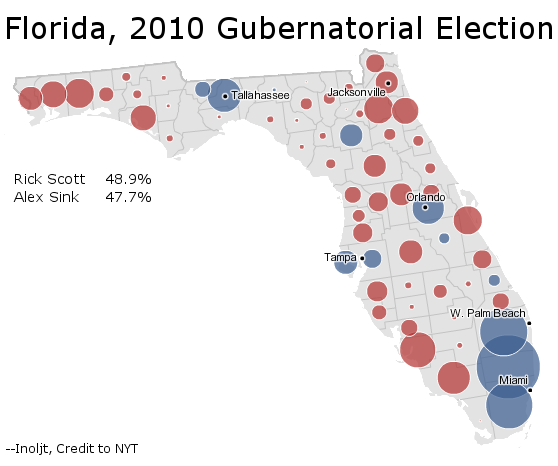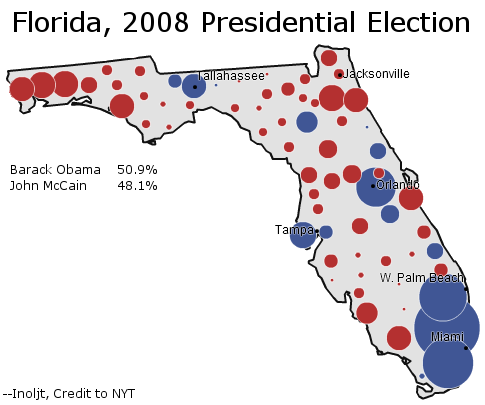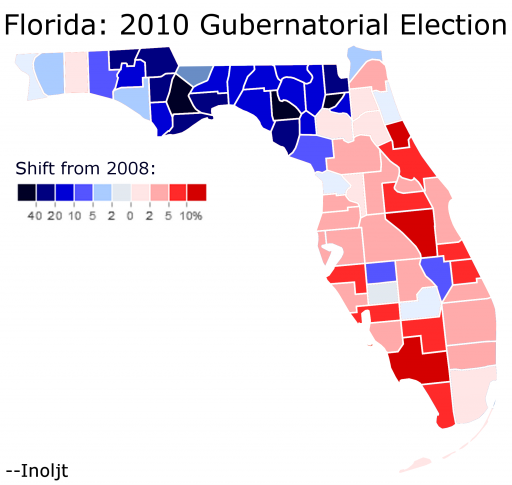• MI-Sen: Peter Hoekstra, having just started as a “senior adviser” at Dickstein Shapiro, let Politico know that, despite all appearances associated with his new job, he hasn’t ruled out a 2012 Senate bid, saying he’s keeping his options open. (I know that on my first day on the job, I like to loudly tell everybody that I may not be working there much longer. Really helps you get off on the right foot with your boss.)
• MT-Sen: Jon Tester wasted no time in going after newly-announced Denny Rehberg, drawing connections between Rehberg and Michele Bachmann (and her proposed $4.5 billion in VA cuts). Bachmann will be a featured speaker at the event on Saturday where Rehberg formally announces. Tester raised $128K in Q4 with $562K, a decent amount for the small state of Montana but not much different from Rehberg’s $553K war chest.
• TX-Sen: You might remember talk from a couple years ago where ESPN analyst Craig James was interested in running for what was then expected to be a Senate special election to replace a resigning Kay Bailey Hutchison. That faded into the mists of time, but here’s the first statement of interest I’ve seen from him since the race re-opened up thanks to her retirement. It comes up in the context of him saying that, yes, he believes people in Lubbock would still vote for him despite his role in getting Texas Tech football coach Mike Leach fired.
• UT-Sen: An interesting piece about Orrin Hatch focuses mostly on how he’s trying to avoid the fate of Bob Bennett by reaching out and engaging the local tea party crowd as much as possible; a local ‘bagger comments that Hatch shouldn’t expect their endorsement but his efforts will really limit the outrage that seemed to overwhelm Bennett. (Hatch also has an interesting selling point to offer them: if he’s defeated but the GOP takes the Senate, that puts Olympia Snowe in charge of Finance.) Buried in the story is a provocative comment from Bennett’s vanquisher, Mike Lee, who only says that he’ll “fully support” the GOP nominee without saying anything about backing Hatch.
• AK-AL, NY-13: Here are two House races where the potential challenger has the financial advantage, according to new Q4 numbers. One is the possible GOP primary for Alaska’s at-large seat, where Joe Miller has $825K left in the bank, thanks to money he didn’t get a chance to spend on his legal defense, whereas Don Young has $170K CoH. (Miller, of course, hasn’t said anything specific about a race against Young in 2012, but he and Young have publicly traded some barbs.) The other is NY-13, where surprise Republican victor Michael Grimm actually finds himself in debt, with a net minus-$36K while Democratic ex-Rep. Mike McMahon, who seems to be laying groundwork for a rematch, has $17K CoH leftover.
• IN-05, IN-06: Roll Call looks at the slowly-developing race to replace Mike Pence in the 6th. Most (if not all) the action is on the GOP side so far, with former Wayne Co. Sheriff Matt Strittmatter the only one with a campaign account open so far (which contains $39K). Other GOPers include 1990s-era ex. Rep. David McIntosh, Henry County Council president Nate LaMar, ’10 Senate primary loser Don Bates, and ’10 IN-05 primary loser Luke Messer… but it sounds like Messer, who almost beat the unloved Dan Burton, may be running in the 5th again, seeing as how Roll Call got Burton’s office to confirm that Burton (frequent subject of retirement speculation) plans to run for re-election. One other wrinkle: Republican redistricting efforts to redden Joe Donnelly’s IN-02 may wind up making IN-06 less Republican, so that might encourage Dems to at least consider playing in the 6th.
• MT-AL: With Montana’s at-large House seat suddenly looking like it’s on track to be an open seat, we may actually get some decent Democratic candidates in the race. It’s occasionally been a competitive seat, currently at R+7, though not really hotly contested since the last time it was open, in 2000. Democratic State Rep. Franke Wilmer of Bozeman is already floating her name for the race. (If she won, she’d be the first woman in the seat since the legendary Jeannette Rankin.)
• SD-AL: Now this is interesting: Stephanie Herseth Sandlin (haven’t heard anything about a rematch, but this might perk up her ears) is actually leading a hypothetical rematch by one point (46-45) against new Republican Rep. Kristi Noem, according to PPP. PPP points out that she lost by three in 2010, so that small shift is consistent with the small nationwide bump upwards for the Dems over the last month or two. Herseth Sandlin’s favorables are 55/36, compared with Noem’s 38/35 approvals. Over on the Senate side, Tim Johnson (who isn’t up until 2014) is at 47/41 approval.
• LA-AG: We’ve seen a couple dozen legislative party-switchers from the Democrats to the Republicans in southern states in the last few months, in the wake of several states’ chambers finally completing their realignment all the way down to the state level, but nobody at a statewide level doing so… until now. Louisiana AG Buddy Caldwell, facing a potentially tough general election, plans to switch to Republican status. (I’d invoke the cautionary specter of Parker Griffith, but Louisiana uses a jungle primary so switching to a potentially tough primary instead may not be the kiss of death.) Since Caldwell was already the only Democratic AG who had joined the multi-state lawsuit against healthcare reform, his “Democrat” status was pretty negligible at this point.
• MA-St. House: This may be one of the largest constituencies where I’ve seen a race end in a tie (although I’m sure someone in the comments can come up with a historic example of an even bigger race that tied). The November election in Massachusetts’s 6th Worcester district in the state House was just declared a tie by a superior court judge, and (rather than flipping a coin, drawing lots, or sending them to Thunderdome) a do-over special election was ordered. Democratic incumbent Geraldo Alicea and GOPer Peter Durant both got 6,587 votes. No date has been set yet, but we’ll all be on pins and needles that night, seeing as how Dems control that chamber by only a 128-31 margin.
• CA-Referenda: A statewide special election is planned for some point in June, as Jerry Brown seeks a public mandate for extending increases in three different taxes (and he seems to think he has a better shot getting this through a public vote than the legislature). This is likely to be an entirely vote-by-mail affair, presaging a potential California shift in the direction of its west coast brethren. Somewhat counterintuitively (since vote-by-mail is usually considered to boost Dems), though, observers think this might skew the election toward older, whiter voters, as mail delivery is “unreliable in spots” (?!?) in heavily-minority Los Angeles County and voters there still tend to rely heavily on polling places. On the plus side, though, a recent PPIC poll found more support for extending the taxes among the 55+ set (56 yes/38 no) than among the entire population (where there was 50 yes/48 no support). Have the most seriously tax-hating seniors all fled to Arizona?
• Fundraising: The Fix has a bunch more Senate fundraising numbers to report, building on the numbers we gave you yesterday. For the Dems, Bob Casey Jr. seems to be fully engaged with his race, pulling in $621K in Q4 for $1.3 million CoH, while the publicity surrounding FiliBernie seems to have been a big cash cow for Bernie Sanders, who raised $485K for $536K CoH. Bob Menendez raised $237K for $2.4 million CoH, while freshly-elected Joe Manchin seemed to take a breather from fundraising, raising only $18K for $377K. Among not just vulnerable Republicans but basically everybody else in the Senate, Scott Brown is still the unstoppable money machine, in terms of both cash raised and CoH: $734K raised for $7.2 million CoH. Richard Lugar raised $173K for $2.35 million CoH, while Olympia Snowe raised $79K for $1.2 million CoH.
• Census: We’re still waiting for this week’s released of detailed 2010 data for Louisiana, Mississippi, New Jersey, and Virginia, but the Census Bureau is letting us know that next week they’ll be out with four more: Arkansas, Indiana, Iowa, and Maryland.
• WATN?: Rod Grams somehow managed to be one of the least memorable Senators of my lifetime who managed to serve a full term (surprisingly swept in in Minnesota in 1994, easily turned out in 2000), and now he’s working a job that seems befitting his anonymity. He’s working as a Hill staffer, and not even on the Senate side: he’s the new chief of staff to new MN-08 Rep. Chip Cravaack. (Recall that Cravaack did what Grams couldn’t do in 2006: knock off Jim Oberstar, in what was a strange comeback attempt by Grams.)


